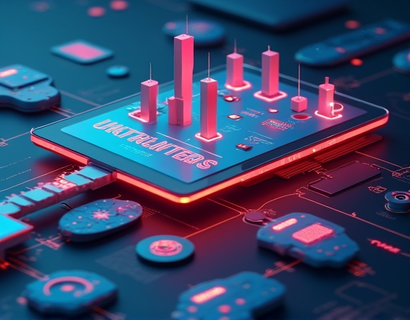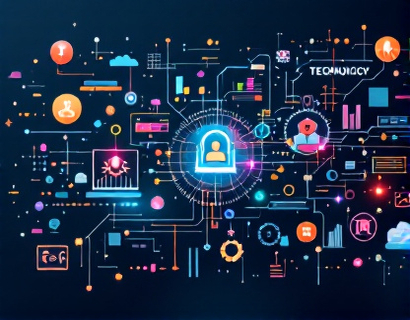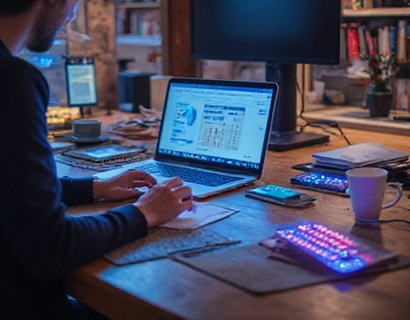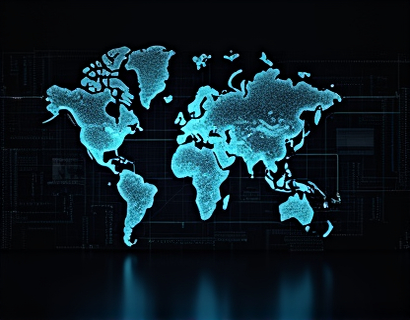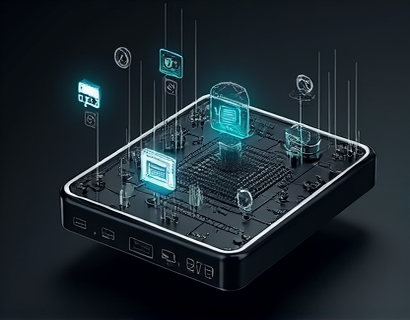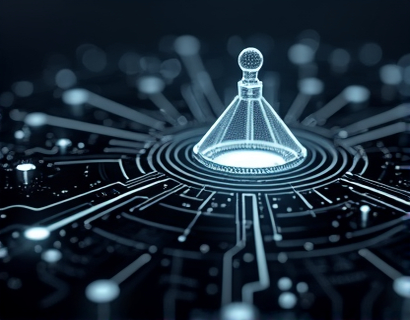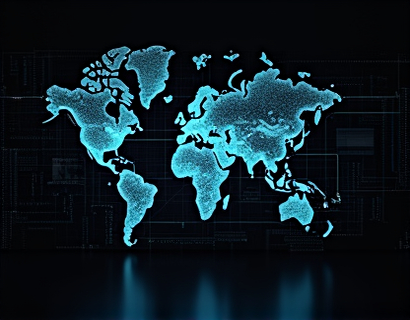Decentralized Venture Launch: Streamline Your DAO and Autonomous Project Creation
The landscape of business and entrepreneurship is evolving rapidly, driven by technological advancements and the rise of decentralized systems. Decentralized Autonomous Organizations (DAOs) are at the forefront of this transformation, offering innovative ways for companies and organizations to operate without traditional hierarchical structures. This article explores how to streamline the launch of DAOs and autonomous projects using cutting-edge tools and resources, unlocking the future of venture creation.
Understanding Decentralized Autonomous Organizations (DAOs)
DAOs represent a new paradigm in organizational structure, leveraging blockchain technology to enable decentralized decision-making and governance. Unlike traditional organizations, DAOs operate on smart contracts, which are self-executing contracts with the terms of the agreement directly written into code. This allows for transparency, security, and efficiency in operations.
Key Features of DAOs
- Decentralization: Power and control are distributed among members rather than centralized in a single authority.
- Transparency: All transactions and decisions are recorded on the blockchain, accessible to all members.
- Autonomy: DAOs operate independently of external control, driven by the consensus of their members.
- Token-based Governance: Members typically hold tokens that represent voting power, allowing them to influence decisions.
The Importance of Streamlining DAO Launches
Launching a DAO can be a complex process, often requiring technical expertise, legal considerations, and a clear understanding of governance structures. Streamlining this process is essential for organizations looking to harness the benefits of decentralized models without getting bogged down in administrative hurdles.
Challenges in Launching a DAO
- Technical Complexity: Developing smart contracts and integrating blockchain technology can be daunting for non-technical founders.
- Legal Compliance: Navigating the regulatory landscape surrounding cryptocurrencies and DAOs can be challenging.
- Community Building: Attracting and engaging a community of members who are invested in the DAO's success is crucial.
- Governance Structure: Establishing a clear and effective governance model is essential for decision-making and conflict resolution.
Cutting-Edge Tools for DAO Creation
To address these challenges, a variety of tools and resources have emerged, designed to simplify the process of launching and managing DAOs. These tools provide essential functionalities that facilitate seamless integration and operation of decentralized projects.
1. Smart Contract Development Platforms
Smart contracts are the backbone of any DAO. Platforms like Ethereum, Binance Smart Chain, and Polkadot offer robust environments for developing and deploying smart contracts. These platforms provide developers with the necessary tools to create, test, and launch smart contracts efficiently.
2. DAO Frameworks
Several frameworks have been developed specifically for creating DAOs, such as Aragon, DAOstack, and MolochDAO. These frameworks offer pre-built governance models, allowing organizations to customize their DAOs without starting from scratch. They provide user-friendly interfaces for managing proposals, voting, and treasury management.
3. Community Engagement Tools
Building a strong community is vital for the success of a DAO. Tools like Discord, Telegram, and Reddit facilitate communication and engagement among members. Additionally, platforms like Snapshot allow for off-chain voting, enabling members to participate in governance without incurring high transaction fees.
4. Legal and Compliance Resources
Understanding the legal implications of launching a DAO is crucial. Resources such as legal advisory services specializing in blockchain technology can help organizations navigate the regulatory landscape. Additionally, templates for governance documents and compliance checklists can streamline the legal setup process.
Steps to Launching a DAO
Launching a DAO involves several key steps, each requiring careful consideration and planning. Here’s a streamlined approach to launching your decentralized venture.
Step 1: Define Your Purpose and Vision
Before diving into the technical aspects, it’s essential to clearly define the purpose and vision of your DAO. What problem does it aim to solve? What value does it provide to its members? A well-defined mission will guide the development process and attract like-minded individuals to your community.
Step 2: Choose the Right Blockchain Platform
Selecting the appropriate blockchain platform is critical for your DAO’s success. Consider factors such as scalability, transaction costs, and community support. Ethereum remains the most popular choice due to its extensive developer ecosystem, but other platforms may offer advantages depending on your specific needs.
Step 3: Develop Smart Contracts
Once you’ve chosen a platform, the next step is to develop the smart contracts that will govern your DAO. This includes creating contracts for voting, treasury management, and any other functionalities specific to your organization. It’s advisable to work with experienced developers to ensure the security and efficiency of your contracts.
Step 4: Establish Governance Structures
Decide on the governance model that best fits your DAO. Will it be token-based voting, reputation-based governance, or a hybrid model? Clearly outline the roles and responsibilities of members, as well as the processes for proposing and voting on changes.
Step 5: Build Your Community
Engaging a community of supporters is crucial for the sustainability of your DAO. Utilize social media, forums, and community events to attract members. Encourage participation by offering incentives, such as governance tokens or exclusive access to resources.
Step 6: Launch and Iterate
After thorough testing and community engagement, it’s time to launch your DAO. Monitor its performance and gather feedback from members to identify areas for improvement. DAOs are inherently flexible, allowing for continuous iteration and adaptation based on community needs.
Case Studies of Successful DAOs
To illustrate the potential of DAOs, let’s explore a few successful examples that have effectively leveraged decentralized governance and community engagement.
1. MakerDAO
MakerDAO is one of the most well-known DAOs, responsible for the creation of the DAI stablecoin. It operates on a decentralized governance model, allowing MKR token holders to vote on key decisions, such as risk parameters and collateral types. MakerDAO has successfully maintained its stability and transparency, attracting a large community of users and developers.
2. Gitcoin
Gitcoin is a platform that connects developers with open-source projects, funded by a decentralized community. Through its DAO structure, Gitcoin allows stakeholders to vote on funding proposals, ensuring that resources are allocated to projects that align with the community’s values. This model has fostered innovation and collaboration within the open-source ecosystem.
3. Aave
Aave is a decentralized lending protocol that enables users to lend and borrow cryptocurrencies without intermediaries. Its governance is managed by AAVE token holders, who can propose and vote on changes to the protocol. Aave has successfully built a vibrant community and has become a leader in the DeFi space.
The Future of Venture Creation with DAOs
The rise of DAOs signifies a shift towards more democratic and inclusive business models. As organizations increasingly adopt decentralized structures, we can expect to see a transformation in how ventures are created and managed. The potential for innovation is immense, as DAOs empower individuals to collaborate and contribute to projects that resonate with their values.
Emerging Trends in DAO Development
- Interoperability: Future DAOs will likely focus on interoperability between different blockchain platforms, allowing for seamless collaboration and resource sharing.
- Enhanced Governance Models: As DAOs mature, we can expect to see more sophisticated governance models that incorporate elements of liquid democracy and reputation systems.
- Integration with Traditional Businesses: The lines between traditional businesses and DAOs may blur, leading to hybrid models that leverage the strengths of both structures.
- Focus on Sustainability: DAOs will increasingly prioritize sustainability and social impact, aligning their missions with the values of their communities.
Conclusion
Decentralized Autonomous Organizations represent a revolutionary approach to venture creation, offering unprecedented opportunities for innovation and collaboration. By leveraging cutting-edge tools and resources, organizations can streamline the process of launching DAOs and autonomous projects, unlocking the potential of decentralized business models. As we move forward, embracing the principles of decentralization will be key to driving progress and fostering a more inclusive and equitable future for all.




